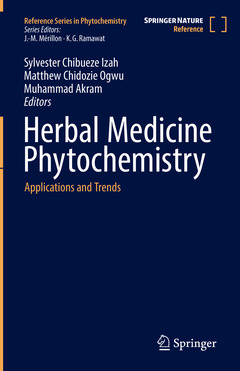Herbal Medicine Phytochemistry, 1st ed. 2024 Applications and Trends Reference Series in Phytochemistry Series
Coordonnateurs : Izah Sylvester Chibueze, Ogwu Matthew Chidozie, Akram Muhammad

This book offers a comprehensive perspective of herbal medicine phytochemistry and explores the application of plant extracts as bioactive compounds in disease prevention and treatment in modern or traditional medicine. The book starts with an introduction to the history and value of herbal medicine, followed by 3 parts covering the main phytochemical components and metabolites in herbal medicine, different uses and practices in herbal medicine, including a region-wise analysis of methods and practices and an overview of regulations and policies for herbal medicinal practitioners, and the advances and challenges in quality assessment of herbal medicine.
Plants generally have the tendency to bioaccumulate trace metals from the environment and they are easily contaminated by microorganisms from water sources and poor hygiene practices of the herbalist. Quality assessment and assurance is, thus, a pertinent challenge in herbal medicine practice (i.e., in remedy formulation and application), and this book offers an authoritative perspective on this topic, covering aspects such as quality control strategies, preparation techniques, chemical quantification in phytomedicine, and the efficacy and safety of herbal remedies. Moreover, in this book, readers will find valuable insights into the latest trends and developments in the field, and a critical review of the application of medicinal plants to treat cardiovascular, digestive, respiratory neurological and reproductive diseases. Particular attention is given to the advances and trends in the field, and readers will learn about the latest biotechnological approaches, the use of nanotechnology in herbal medicine, metabolomic analysis of medicinal plants, big data application in herbal medicine, and the value of herbal medicine towards sustainability. Given its breadth, this book is aimed at researchers, academics, practitioners and professionals working in the fields of natural, life, health, clinical, and biomedical sciences, and interested in herbal remedies, pharmacology, pharmacognosy, human nutrition and dietetics, plant biology, and biotechnology/microbiology.Dr. Sylvester Izah is a lecturer at the Bayelsa Medical University in Yenagoa, Nigeria, and he holds a Ph.D. in Applied Microbiology and Environmental Health, a M.Sc. in Applied Microbiology, and a B.Sc. in Biological Sciences from Niger Delta University, Nigeria. Dr. Izah worked for an environmental consultancy firm for over six years, focusing on soil, water and atmospheric assessment. In the course of his career, he carried out studies on vegetation and biodiversity concerning species diversity and composition. With 220+ peer-reviewed publications including articles and book chapters, Dr. Izah’s research is mainly focused in the fields of applied microbiology and plant biotechnology, herbal medicine, public and environmental health, risk assessment, bioenergy, toxicology, and biodiversity.
Dr. Matthew Chidozie Ogwu is an Assistant Professor of Integrated Ecology and Sustainable Development at the Appalachian State University, UnitedStates of America. He obtained his Ph.D. in Biological Sciences from Seoul National University, South Korea, and his M.Sc. (Distinction) and B.Sc. (First Class Hons.) in Plant Diversity and Conservation and Plant Biology and Biotechnology, respectively, from the University of Benin, Nigeria. Dr. Ogwu has published 90+ peer-reviewed works and presented his results at international conferences. His research focuses on sustainable environmental development, soil microbial and geographical ecology, economic plant characterization for breeding and conservation, ethnobotany and biodiversity issues and policies. During his time as a Lecturer and Researcher at the University of Benin, Nigeria, and the Centre for Floristic Research of the Apennines, Italy, he taught courses within the integrated natural sciences, mentored numerous students, collaborated with experts from diverse backgrounds and contributed to the European Union-funded NATURA LIFE research project on biodiversity and ecosystem manag
Date de parution : 06-2024
Ouvrage de 2153 p.
15.5x23.5 cm



